Cornish cross are one of the least healthy chickens to eat all they do is eat!
Navigation
Install the app
How to install the app on iOS
Follow along with the video below to see how to install our site as a web app on your home screen.
Note: This feature may not be available in some browsers.
More options
You are using an out of date browser. It may not display this or other websites correctly.
You should upgrade or use an alternative browser.
You should upgrade or use an alternative browser.
-
 d213c165_cornish_cross-21703-475586.jpeg3.8 KB · Views: 3,042
d213c165_cornish_cross-21703-475586.jpeg3.8 KB · Views: 3,042 -
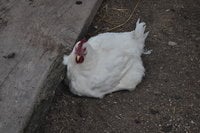 6ab252da_DSC_0088.jpeg2.9 MB · Views: 3,122
6ab252da_DSC_0088.jpeg2.9 MB · Views: 3,122 -
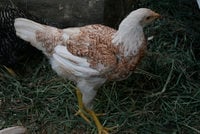 f67a56b8_QDI_Marilyn.jpeg367.8 KB · Views: 3,152
f67a56b8_QDI_Marilyn.jpeg367.8 KB · Views: 3,152 -
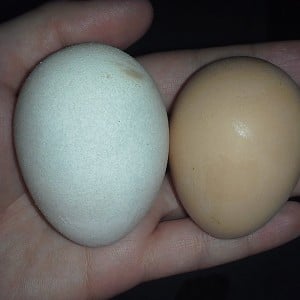 white egg.jpg196.2 KB · Views: 2,004
white egg.jpg196.2 KB · Views: 2,004 -
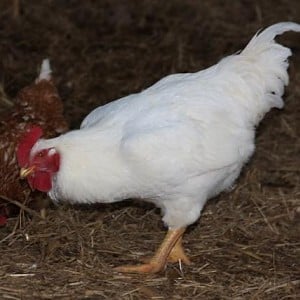 Rooster.jpg34.2 KB · Views: 2,101
Rooster.jpg34.2 KB · Views: 2,101 -
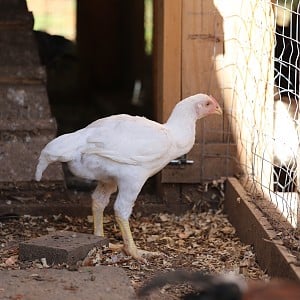 Juvenile.jpg508.4 KB · Views: 2,021
Juvenile.jpg508.4 KB · Views: 2,021 -
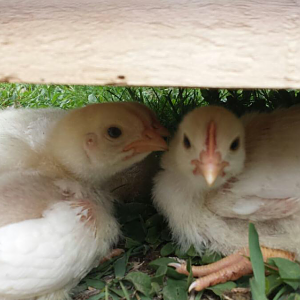 chicks.png1.3 MB · Views: 2,084
chicks.png1.3 MB · Views: 2,084
Cornish Cross
- Added by Super Admin
- Create date
- Updated
Cornish Cross (Cornish X) chickens are the standard meat chicken for the American market. ...
- BantamFan4Life
- 1.00 star(s)
Pros: none
Cons: not very healthy to eat,they produces too fast.
- SwampPrincessChick
- 1.00 star(s)
Pros: Great for meat production, resilient to many diseases such as coccidiosis and fowl pox.
Cons: Nasty, loud, eats too much, annoying, aggressive, stupid, destructive, not scared of predators.
Cornish Cross are one of the worst breeds I have seen in my life, if not the top worst. The only thing they do all day is sit in their poop and continually eat, only occasionally roaming around the yard even though there is plenty of space for them to do so. Not to mention that their poop is literally everywhere you step and it is in huge piles, much larger than a normal chicken's. They are destructive and turn everything to a pile of poop and mud. Cornish Cross are oriented so much to food that they attack you for it. This goes for both genders; the cockerel started attacking me first when he saw me with the feed bucket, and the pullets followed along and attacked me as well. Two of them died before butcher age, one from leg problems and the other one from a heart attack. Cornish Cross are extremely loud and they constantly make this annoying honking noise because they choke on their food since they eat so fast and so much. The only things good about this crossbreed is that they are fast choice for meat production and they can easily fight off diseases such as coccidiosis and fowl pox, but other than that, don't waste your time and your yard space. American Bresse would be much better.
- CandySilkieGirl
- 2.00 star(s)
Pros: Great meat
Cons: Dumb, Do not stop eating, so messy
I don't think you will ever get an egg from these chickens. The only hen we tried to keep died young of heart failure. They can barely walk and have a lack of feathers! But I can say they taste good!
- ozu
- 2.00 star(s)
Pros: Friendly as chicks, easy to get attached. Produce a LOT of meat.
Cons: Grow too fast, all they do is poop/eat/sleep/pant.
We had two and it was hard not to grow heaps attached to them because they had very sweet and friendly personalities as chicks. But as they grew they just became a pain. We were cleaning up after them every day and it was hard to watch them struggle to walk. When they weren't struggling to walk and panting, they were shooting out poop and stuffing their faces or sleeping. Even had a prolapse in one chick. They only ever got up to eat. If I wanted to raise chickens for meat, I would choose a different breed.
- MamaKitty913
- 3.00 star(s)
- RJSchaefer
- 3.00 star(s)
Pros: Meaty, friendly, great foragers, low-brooding time
Cons: Overzealous at feeding time, slowed growth when free-ranged
We've done two runs of free-ranged Cornish X this year and neither has lived up to the hype. They meat up faster than layers, but don't provide the excellent return on investment as promised. I'm sure they'd grow out faster in confinement, but they are wonderful foragers and have absolutely rid our farm of Japanese beetles, cicadas, locusts and other nuisance insects. They are intelligent, friendly birds who easily acclimated to life in our laying flock and readily return to roost at night. My main complaint is they are extremely zealous eaters and come from all corners of the yard to mob me for feed if I so much as walk near the coop.
- Purchase Price
- 1.65
- Purchase Date
- 2013-07-09
- CherryChick
- 3.00 star(s)
Pros: Huge Breast Meat
Cons: Dirty,Sad,Eats a LOT
I'm really torn on what I feel about the breed. They were very active when they were a couple weeks old and then they just got so heavy that they didn't do much moving at all. I constantly had to clean them up because they would lay right next to the feeder in their poo. So they got regular baths to clean them up. They could only take a couple steps and had to sit down for a while. I found this very heart breaking that they couldn't have "normal chicken lives" We feed them flock raiser for 5 weeks and the last 3 weeks we switched to meatbird food. (No Hormones or Antibiotics) But when it came to slaughter this last weekend. The breast meat was huge!! I've never seen breast meat that big. We cooked it up that night and tasted great. And had enought left over from one breast to serve about 4 people. I don't like dark meat so this breed is perfect. but it is just so hard to watch them live like that.
- Purchase Price
- 3.00
- Purchase Date
- 2012-03-05
- LAChickens
- 3.00 star(s)
Pros: Gregarious, curious, amusing
Cons: Can be aggressive, bossy,
Okay, I'm coming to this sideways. I picked up 3 "blonde chicks" and was told that they were Buff Orpingtons, but their shape was wrong and their color didn't develop correctly ether. Then I was told that they were perhaps red splash Wyandottes. I have have Silver-laced Wyandottes and these are not Wyandottes. They are hard-feathered, long-necked birds closer in shape to the Game Birds. They are still growing, but very boxy in shape with a long neck and small head. Pea combed, yellow legs. The friendliest chicks I started out with, one of them has turned out to be an aggressive pecker. I'm keeping hens for eggs, I feel these may fall short of the mark. They are the guard dogs of my flock, and the policemen.
- Purchase Date
- 2011-10-01
- cynthiagee
- 3.00 star(s)
Pros: Fast growth, big meaty birds, pullets mature into reliable egg layers, GREAT cold tolerance
Cons: FLIP in cockerels, hens are short-lived due to heart problems, heat intolerant, and huge amounts of POOP!!!
We've been raising these birds for years. Aside from a tendency to heat intolerance, the biggest downside to this breed is the HUGE amount of poop they produce - think turds the size of golf balls, from every bird, all day long! Other than that, they are relatively trouble-free birds, as long as you don't overfeed them.
A little known side benefit of this breed are their eggs - I usually order all roosters and the few that turn out to be pullets get added to our laying flock. The pullets lay enormous eggs with huge yolks on an almost daily basis. They begin laying at about 20 weeks of age, provided they are hatched early enough in the spring to allow them to mature by late summer (pullets from late summer or autumn hatchings often never begin laying at all); unfortunately, most Cornish cross hens only live to about 18 months of age, due to a tendency toward heart problems.
A little known side benefit of this breed are their eggs - I usually order all roosters and the few that turn out to be pullets get added to our laying flock. The pullets lay enormous eggs with huge yolks on an almost daily basis. They begin laying at about 20 weeks of age, provided they are hatched early enough in the spring to allow them to mature by late summer (pullets from late summer or autumn hatchings often never begin laying at all); unfortunately, most Cornish cross hens only live to about 18 months of age, due to a tendency toward heart problems.
- Twistedfeather
- 3.00 star(s)
Pros: Fast growing, easy to raise, Confine themselves in small spaces
Cons: Can be messy, develop more problems than normal chickens, get so big that they can't hold themselves up
Developed to produce a bigger carcass compared to the slightly skinnier chicken that was being produced the Cornish Cross is a result of mating a double breasted cornish male and a tall large boned Plymouth Rock female according to Wikipedia. They are the main commercial meat bird because conveniently they can grow in 7 weeks or 14 weeks depending on the strain. Cornish Cross do not make the best backyard birds since they do tend to tear up the property more plus the fact that they were designed only to eat, drink, and poop you'll be better off picking a Barred Rock or Silkie as a backyard chicken. Those who want to make a small profit can raise these for meat just watch the feed price as these monster birds do eat more because of a quicker metabolism. Ever since the Cornish Cross developed new clinical conditions have been discovered or re-looked into. The most common might be slipped tendon, Breast Blisters, and other more serious diseases sweep through a flock. Good management of weight would be suggested as they get can get overweight and develop undesirable fat.
- KelsiNS
- 3.00 star(s)
Pros: rapid growth, friendly, easy going
Cons: gluttonous
I have a brooder full of these guys in my bedroom right now. They are laid back chicks, very friendly and alright with being handled frequently. I was overwhelmed by how much they can consume, I always have a pan of feed for new chicks and at less than a week old I am already limiting their intake-they polished off over 4 cups of feed the first day, an amount that typically takes my day old poultry 3-5 days to finish. Needless to say, they do not get that much anymore. They also drink much more than the other breeds I have raised.
I'm planning on holding over a few pullets to see if we can get eggs/chicks from them with my huge Delaware roosters, but it remains to be seen if im going to WANT to keep these guys that long-they are tiny predators roaming the brooder!
I'm planning on holding over a few pullets to see if we can get eggs/chicks from them with my huge Delaware roosters, but it remains to be seen if im going to WANT to keep these guys that long-they are tiny predators roaming the brooder!
- Henny peeny
- 3.00 star(s)
Pros: fast growing
Cons: short life
I had two a male a female I dind't know they had such a short life I hear they are to be culled at 6 to 8 weeks but I think they could live longer the trouble with them is they grow so fast and as this is their legs have problems they lay around a lot but still get leg problems. This is why I had to cull both at 5 and 6 months old. The male got a bad limp I was trying to get him better but on advice saying if her could get better it would only happen again so then the fmale was not long after she started to linp and fromhaving the mae I knew her time came. The male ws very freindly but the female was not.
Miss them still
Rhayden
Miss them still
Rhayden
- Purchase Price
- 5.00
- Purchase Date
- 2011-05-15
- erinchelsea
- 4.00 star(s)
Pros: Fast growth, easy to fence, good feed/growth ratio, lots of tender white meat, easy to pluck, sweet friendly birds
Cons: Need to be managed properly to avoid problems such as leg problems or early death
We have raised several batches of Cornish cross from different hatcheries and have had great success. I love that they are ready to process in 6-8 weeks and then they are done, as opposed to other meat breeds or dual purpose breeds that take much longer to finish. They have so much meat on them and it is tender, delicious, mostly white meat. They do much better raised on pasture with room to roam or in tractors moved frequently to give them plenty of greens to eat and to keep them clean. They have a tendency to over eat if allowed so we restrict feed to only 12 hours a day, and take the food away for the other 12 hours a day. They also require a lot of fresh water to drink but if managed properly are very easy to raise.
- Chicken Wanter
- 4.00 star(s)
Pros: Fast, fun to play with, strong, eats anything, handles pain well, large, flies well.
Cons: Poops a lot, likes to venture far, eats a lot, flies well.
These are good starter chickens. They're slightly aggressive, but only males to each other. They are submissive when caught or even if your hand is on their back. They like running around, so try to fence them in, though they don't go too far. They actually run really fast, and even fly as a last resort. They can fly slightly, up to about a foot, and only for a few seconds. They eat a lot, but eat most anything. They do poop a lot, so let them roam on grass so it comes to a use. If you try wrapping a long string around their foot to catch them, they will run, curl up the trapped foot to free it, and run off. All in all, they are good starters, and I recommend this breed.
- Loc20chick
- 4.00 star(s)
Pros: Friendly, easy to handle bird. Great feed/meat conversion ratiodue to fast growth. Good forager, great tasting.
Cons: Can eat alot if penned all day.
Raised four CX from day1, after learning about Fermented feed and feeding this to them, they ate less but kept growing, they didn't have the disgusting liquid poop that most people describe here. They had tender great tasting meat, better than the store bought ones.
- fryburgfarmer
- 4.00 star(s)
Pros: Delicious, Calm, CURIOUS, Great Foragers, & Fast Growers
Cons: Must be Butchered at the Correct Time (can't holf off or leg problems/heart problems will occur), Eat like Crazy, Poop OFTEN
I've had Cornish Cross's as my meat birds for years now and LOVE those sweethearts! They are evil! They make you fall in love, then you have to butcher them soon after!! They wonder and forage GREAT but trust me, they can eat! Lovely birds with rapid growth. Just watch out for health problems as a result.
- Bigwig
- 4.00 star(s)
Pros: Good egg production, friendly and docile.
Cons: Leg weaknesses, eats a lot, poops a lot.
My Cornish Rock Cross hen has been very friendly towards people and other chickens and has laid more eggs than any other breed I have (Barred Rocks, Speckled Sussex, Americana, and Red Cross). She will follow us around the yard and will come when called. The downside to this breed is the vast quantity of poop produced as well as leg weaknesses (bumble-foot is a real issue with this breed).
- urbanchicksfarm
- 4.00 star(s)
Pros: fast growing, funny to watch, good eatin'
Cons: freaky fast growth
I am not sure where I stand on these. I raised a few last year and they did their job, but their "chickeness" is gone. They grew so fast that they were half bald for their entire life. They couldn't fly and ran awkwardly. These things both repelled me and made me laugh. But in 10 weeks they were in my freezer.
I will raise again this year with some Dixie Rangers to compare.
I will raise again this year with some Dixie Rangers to compare.
- Purchase Price
- 1.95
- Purchase Date
- 2011-06-05
- ChickenBoy99
- 5.00 star(s)
Pros: Fast growing and good tasting
Cons: grows so fast they have heart attacks
Great meat birds but not very hardy.
- Lbrad7
- 5.00 star(s)
Pros: Incredible meat bird VERY fast growers
Cons: Can have leg problems, dumb as a rock.
*this review is mostly for the jumbo version of this breed*
Great birds for eating..growth rate is amazing!
Do not buy these birds as pets. They are bred for eating and to not do so within 12 weeks is in my opinion, cruel. They grow very fast and if kept past 12 weeks or so get grotesquely huge. They can be amusing in that they are dumb as rocks and have no fear of humans or for that matter anything else.
Great birds for eating..growth rate is amazing!
Do not buy these birds as pets. They are bred for eating and to not do so within 12 weeks is in my opinion, cruel. They grow very fast and if kept past 12 weeks or so get grotesquely huge. They can be amusing in that they are dumb as rocks and have no fear of humans or for that matter anything else.
